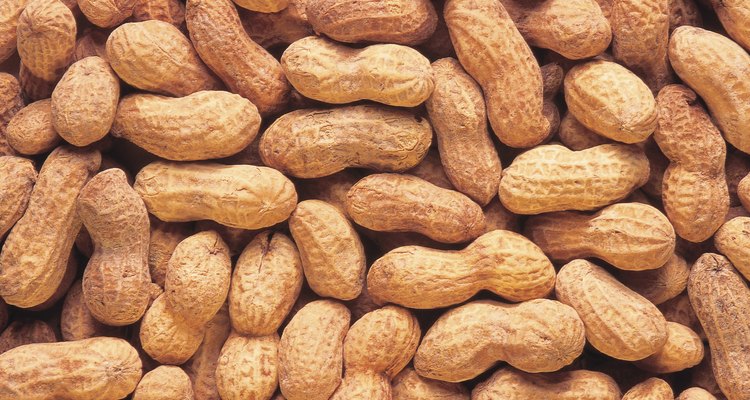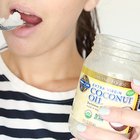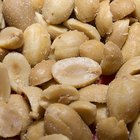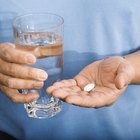
Comstock Images/Stockbyte/Getty Images
According to the National Peanut Board, a research and promotion program funded by farmers, peanuts contain more than 30 essential vitamins and minerals. This fundamental nutritional value, they claim, is one of the reasons why peanuts have remained a staple of American diet and culture for so long. An important benefit of eating peanuts today, says the George Mateljan Foundation, is that peanuts create longer-lasting feelings of fullness that make it easier to lose weight.
Heart Healthy Fat
Raw peanuts are a good source of monounsaturated fats. According to a 2003 study at Purdue University’s Department of Food and Nutrition, this explains why consumption of peanuts reduces cardiovascular disease risk factors. Over 30 weeks, test subjects were exposed to a variety of different diets. The greatest reduction in blood triacylglycerol , some 24 percent, occurred during a period when the subjects consumer 1000 calories of peanuts over a three-week period. Eating raw peanuts allows you to maximize this benefit, since many commercial peanut butters add saturated fats to prevent separation.
Heart Healthy Vitamins and Minerals
According to World’s Healthiest Foods, a website of the George Mateljan Foundation, peanuts are good sources of vitamin E, niacin, folate, protein and manganese. The Purdue University study found that blood levels of magnesium, folate, alpha tocopherol, copper and arginine also increased during periods when test subjects were consuming peanuts. The researchers at Purdue hypothesize that the combination of monounsaturated fats with these heart healthy vitamins and minerals together account for decreased risk of cardiovascular disease associated with eating peanuts.
Resveratrol
Resveratrol is a naturally occurring substance found in grapes that has been credited for several health benefits associated with red wine. Particularly, resveratrol is associated with reduced risk of cardiovascular disease and cancer. A study published in the Journal of Agricultural and Food Chemistry in 2000 found significant levels of resveratrol in the two most common cultivars of peanut grown in the United States. Peanuts contain about a third as much resveratrol as red wines, or less.
Anti-Cancer
A study conducted at the State University of New York, Buffalo published in 2000 found the presence of beta-sitosterol and other phytosterols in peanuts is directly related to the method and extent of processing. Beta-sitosterol has a recognized role in preventing colon, prostate and breast cancer. Roasting and processing peanuts created the greatest reductions in the amount of beta-sitosterol. Unrefined peanut oil had the highest levels of the products tested, while peanut butter had about two-thirds as much beta-sitosterol.
Related Articles

What Are the Benefits of Extrapone ...

How to Prepare & Fry Raw Peanuts

Asian Secret to Removing Cellulite

Skin Benefits of Eating Coconut Oil

Olive Leaf Extract for Skin Problems

Symptoms of Adult Survivors of Child ...

Cocoa Butter Nutrition

What Foods Provide Calcium D-Glucarate?

Peanuts Vs. Pistachios

Benefits of Raw Milk

Differences Between Roasted & Raw Nut ...

Type of Peanuts Used to Make Peanut ...

Recommended Daily Dosage of Saw ...

Traditional Uses of Cuscuta

How Many Calories Are in Peanut M&Ms?

Why Does the Tanning Bed Make You Happy?

Arginine for Hair Growth

L-Arginine & the Skin

Jojoba Oil Benefits

Emotional Effects of Unresolved Issues ...
References
- U.S. National Library of Medicine: Peanut consumption improves indices of cardiovascular disease risk in healthy adults.
- Journal of Agricultural and Food Chemistry: Occurrence of Resveratrol in Edible Peanuts
- U.S. National Library of Medicine: Peanuts as a source of beta-sitosterol, a sterol with anticancer properties.
Resources
Writer Bio
Joseph Nicholson is an independent analyst whose publishing achievements include a cover feature for "Futures Magazine" and a recurring column in the monthly newsletter of a private mint. He received a Bachelor of Arts in English from the University of Florida and is currently attending law school in San Francisco.
Photo Credits
Comstock Images/Stockbyte/Getty Images